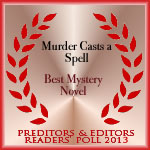Pace is the rhythm at which a scene or interlude moves. The pace should not be uniform. A mystery writer shouldn’t try to keep her stories at a constant high speed because readers will tire of the continuous excitement just as they would if nothing was happening. In addition, if too many clues and twists come too quickly, the fun of unlocking the mystery is taken away from the reader. On the other hand, too few clues too slowly results in the reader losing interest. Pacing suspense is important because a reader needs time to relax between action scenes.
Here’s how to improve pacing:
First, think in terms of scenes and interludes.
Scenes, which are about action, should read slowly as they build up to intense action. A suspenseful scene may last for several pages during which you fully describe all the action and emotion that culminates in the final fast-paced shocker.
Interludes are not so dramatic. They move slowly in the sense that nothing much is happening. But in a pacing sense, they should read quickly. For example, events of a week might be summarized in a single paragraph.
Second, keep those points where your main character finds clues close enough to maintain high reader interest, yet far enough apart that you can tell your story and have subplots in-between. Don’t allow the action to be too compressed or rushed.
Third, if you find your scenes end too quickly, add narrative passages such as the character’s interior dialogue or sensory descriptions—sights, sounds, smells. If your scenes move too slowly, add a few lines of dialogue or a condensed summary.
A novel should balance scenes and interludes that not only push the plot forward but keep it moving smoothly. Read more at Uphill Writing.
More writing tips:
What is Literary Style?
What is Theme in Literature?
Developing Characters is No Mystery
Author’s Voice: How to find it?












Thanks again, for a thought provoking article. Still working on becoming more conscious of all the ingredients that I have put in draft just ‘spontaneously’ without understanding such theory. This didn’t click completely with me in a way that I could apply it to my writing. That’s because I feel I have to test it, and look for examples in my work.
So I will save it, because I’ve never got such ‘good’ insights in the Books on Writing that I have read.
Thank you.
LikeLike
By: Loreen Lee on July 31, 2010
at 11:44 am
I need to work on application of pacing principles myself.
LikeLike
By: Nancy Curteman on May 1, 2011
at 8:51 pm
This is an insightful post, Nancy. I shall be using much, if not all, of this for my own novel’s revisions.
LikeLike
By: aardvarkian on July 31, 2010
at 11:45 am
Did I ever thank you for buying my e-book? Thanks for your support.
LikeLike
By: Nancy Curteman on May 1, 2011
at 8:52 pm
I am currently rewriting my novel as you know. I am also trying to look more carefully at balanced pacing.
LikeLike
By: nancycurteman on July 31, 2010
at 12:07 pm
I am learning terms for the areas in my novel when I would think that something wasn’t quite right. I would keep changing it until I felt it was flowing again. This is very helpful. It was probably the pace I was trying to get right in some cases. Thank you for sharing.
LikeLike
By: Carol Ann Hoel on July 31, 2010
at 12:09 pm
I’m learning, too. That’s the great thing about blogging.
LikeLike
By: nancycurteman on July 31, 2010
at 12:14 pm
To learn, teach.
Excellent post!
LikeLike
By: nrhatch on August 1, 2010
at 6:48 am
Hi Nancy,
By replacing a word here and there, your post could easily be on a music blog!
Pacing is important in individual compositions as well as from one to the next in forming a program.
Too many high points/low points, playing with the same dynamic, or being emotionally intense at all times all tire the audience.
Terrific post!
Good luck with your rewrite.
Gretchen
LikeLike
By: GretchensPianos on August 1, 2010
at 5:44 pm
It seems as though music and writing have many things in common. Really, they are both forms of composition. Thanks for your comment.
LikeLike
By: nancycurteman on August 1, 2010
at 7:57 pm
[…] Pacing: A Critical Element in the Mystery Novel […]
LikeLike
By: How Do Conflict and Crisis Differ in a Mystery Novel? « Global Mysteries on August 14, 2010
at 4:56 pm
[…] to Create Minor Characters in Your Mystery Novel Pacing: A Critical Element in the Mystery Novel What is Literary Style? What is Theme in Literature? Developing Characters is No Mystery […]
LikeLike
By: How Important is Conflict in a Mystery Story? « Global Mysteries on August 14, 2010
at 5:12 pm
[…] Pacing: A Critical Element in the Mystery Novel What is Literary Style? What is Theme in Literature? Developing Characters is No Mystery Author’s Voice: How to find it? Possibly related posts: (automatically generated)Developing Characters is No MysteryA Cast of ThousandsCharacter Development HintsThe curious incident of the dog in the night-time […]
LikeLike
By: How to Create Minor Characters in Your Mystery Novel « Global Mysteries on August 14, 2010
at 5:17 pm
[…] How to Create Minor Characters in Your Mystery Novel Posted by: nancycurteman on August 9, 2010 Pacing: A Critical Element in the Mystery Novel Posted by: nancycurteman on July 31, 2010 What is Literary Style? Posted by: nancycurteman on […]
LikeLike
By: 4 Do’s and Don’ts of “Show, Don’t Tell” « Global Mysteries on August 15, 2010
at 12:53 pm
[…] Important is Conflict in a Mystery Story? How to Create Minor Characters in Your Mystery Novel Pacing: A Critical Element in the Mystery Novel What is Literary Style? What is Theme in Literature? 7 Murder Weapons That Will Challenge The […]
LikeLike
By: 9 Ways to Create Tension in a Mystery Novel « Global Mysteries on August 18, 2010
at 8:17 pm
[…] Important is Conflict in a Mystery Story? How to Create Minor Characters in Your Mystery Novel Pacing: A Critical Element in the Mystery Novel What is Literary Style? What is Theme in Literature? 7 Murder Weapons That Will Challenge The […]
LikeLike
By: What is Story Structure? « Global Mysteries on August 21, 2010
at 3:03 pm
[…] Important is Conflict in a Mystery Story? How to Create Minor Characters in Your Mystery Novel Pacing: A Critical Element in the Mystery Novel What is Literary Style? What is Theme in Literature? 7 Murder Weapons That Will Challenge The […]
LikeLike
By: How to Create Sympathetic Mystery Novel Character « Global Mysteries on August 23, 2010
at 8:22 pm
[…] Important is Conflict in a Mystery Story? How to Create Minor Characters in Your Mystery Novel Pacing: A Critical Element in the Mystery Novel What is Literary Style? What is Theme in Literature? 7 Murder Weapons That Will Challenge The […]
LikeLike
By: How to Write Character Arc in a Mystery Novel? « Global Mysteries on August 26, 2010
at 9:08 pm
[…] Important is Conflict in a Mystery Story? How to Create Minor Characters in Your Mystery Novel Pacing: A Critical Element in the Mystery Novel What is Literary Style? What is Theme in Literature? 7 Murder Weapons That Will Challenge The […]
LikeLike
By: How to Edit a Mystery Novel « Global Mysteries on August 31, 2010
at 11:43 am
[…] Important is Conflict in a Mystery Story? How to Create Minor Characters in Your Mystery Novel Pacing: A Critical Element in the Mystery Novel What is Literary Style? What is Theme in Literature? 7 Murder Weapons That Will Challenge The […]
LikeLike
By: Global Mysteries on October 7, 2010
at 4:04 pm
[…] Important is Conflict in a Mystery Story? How to Create Minor Characters in Your Mystery Novel Pacing: A Critical Element in the Mystery Novel What is Literary Style? What is Theme in Literature? 7 Murder Weapons That Will Challenge The […]
LikeLike
By: 6 Ways to Avoid “Information Dumps” in a Mystery Novel « Global Mysteries on October 11, 2010
at 7:57 pm
[…] Important is Conflict in a Mystery Story? How to Create Minor Characters in Your Mystery Novel Pacing: A Critical Element in the Mystery Novel What is Literary Style? What is Theme in Literature? 7 Murder Weapons That Will Challenge The […]
LikeLike
By: How to Write a Mystery Novel Synopsis « Global Mysteries on October 28, 2010
at 4:23 pm
[…] 9 Ways to Create Tension in a Mystery Novel How Do Conflict and Crisis Differ in a Mystery Novel? How Important is Conflict in a Mystery Story? Pacing: A Critical Element in the Mystery Novel […]
LikeLike
By: How to Write “Killer” Scenes in a Mystery Novel « Global Mysteries on December 30, 2010
at 8:15 pm
[…] Important is Conflict in a Mystery Story? How to Create Minor Characters in Your Mystery Novel Pacing: A Critical Element in the Mystery Novel What is Literary Style? What is Theme in Literature? 7 Murder Weapons That Will Challenge The […]
LikeLike
By: 10 Tips For Writing Backstory in a Mystery Novel « Global Mysteries on January 9, 2011
at 9:29 pm
[…] Do Conflict and Crisis Differ in a Mystery Novel? How Important is Conflict in a Mystery Story? Pacing: A Critical Element in the Mystery Novel What is Literary Style? What is Theme […]
LikeLike
By: 10 Ways to Increase Suspense in Your Mystery Novel « Global Mysteries on January 27, 2011
at 12:12 pm
[…] Pacing: A Critical Element in the Mystery Novel […]
LikeLike
By: Eliminate Pacing Problems in Your Mystery Novel « Global Mysteries on April 30, 2011
at 6:53 pm